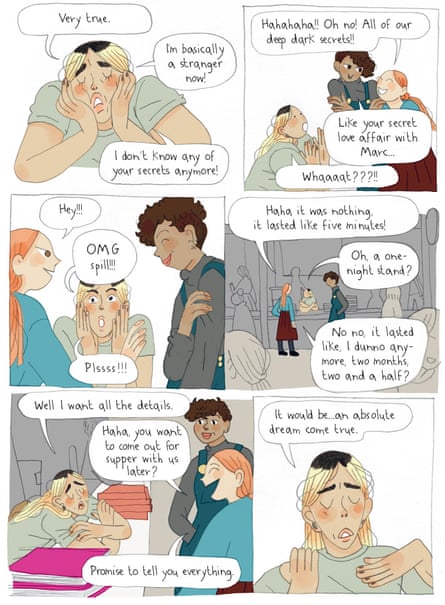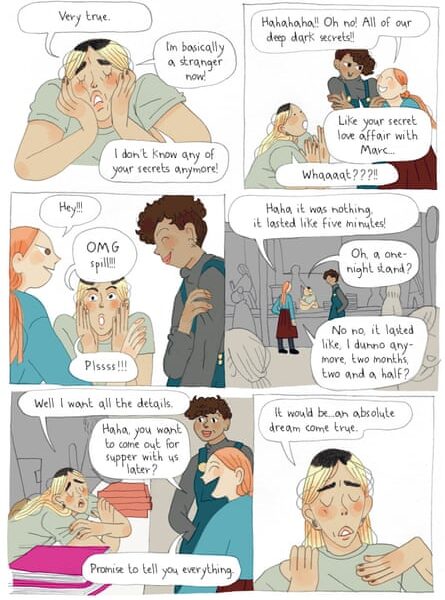I always read the acknowledgments first – is there anyone who doesn’t? – and thanks to this, I came to So Long Sad Love by the French-born, Canada-based cartoonist Mirion Malle half expecting to see women in corsets and long skirts falling madly in love with one another at the back end of the 18th century. But, alas, this was not to be, for all that Malle credits Céline Sciamma’s 2019 film Portrait of a Lady on Fire as her inspiration for this, her third graphic novel to be published in English. While it’s certainly full of women, some of whom may (or may not) be about to fall in love, it’s also set resolutely in the now: an era when, courtesy of WhatsApp and Facebook, word of a bad man’s misdeeds may spread faster than wildfire at midnight.
Malle favours a soapy, forward momentum in her storytelling, and she can’t resist a neat, even a happy, ending. But I found her book irresistible for a different reason. This one celebrates female solidarity, something I feel more and more strongly about at the moment (would that it had arrived at my desk early enough to be included in an anthology I’ve edited on this subject). With its cast of smart, voluptuous female characters – Malle’s women are all eyes, mouths and hair – it reminds me, in the best way, of a classic of 1970s feminism: The Women’s Room by Marilyn French, perhaps, or Robin Morgan’s Sisterhood Is Powerful. Like those writers, she understands the importance of our subterranean networks: grapevines that men, deeming women’s talk to be only gossip, underestimate at their peril.

Cléo, a French cartoonist, has moved from France to Montreal with her boyfriend, Charles, and they’re seemingly happy together in their shared new home. But after an unexpected conversation with the friend of a friend (Farah) – a woman who was at university with Charles – she begins to doubt him. Why did Farah seem so uneasy at the news he was her boyfriend? And why did Charles’s friends, when quizzed about this, talk vaguely of his “obsession”, a fixation that is now, apparently, in the past? Hesitation follows hesitation – she believes that she loves Charles – until the day arrives when her instincts can no longer be ignored. She and Farah speak on FaceTime, at which point her world, like her confidence, collapses.
Malle’s subject is female courage, and how much it has to do with friendship. A lonely woman is an isolated and vulnerable one; sometimes, you just need to hear a girlfriend tell you – even if it’s not strictly true – that most men are creeps; that every woman has known one. Cléo stays with a friend, a lesbian who always loathed Charles; she goes back to him briefly; they separate again. When he begins bombarding her with calls and texts, she boards the first bus she sees, to a small town in the country, where she rents an Airbnb and starts work on a new book. All is tranquil. It isn’t so bad being alone, after all. And also… what’s this? In a coffee shop, she meets a woman and, in as long as it takes one of them to say oatmeal latte, everything changes. The next time we see her looking at the screen of her phone, she’s laughing. It holds no fear for her now.
after newsletter promotion
Source: theguardian.com




